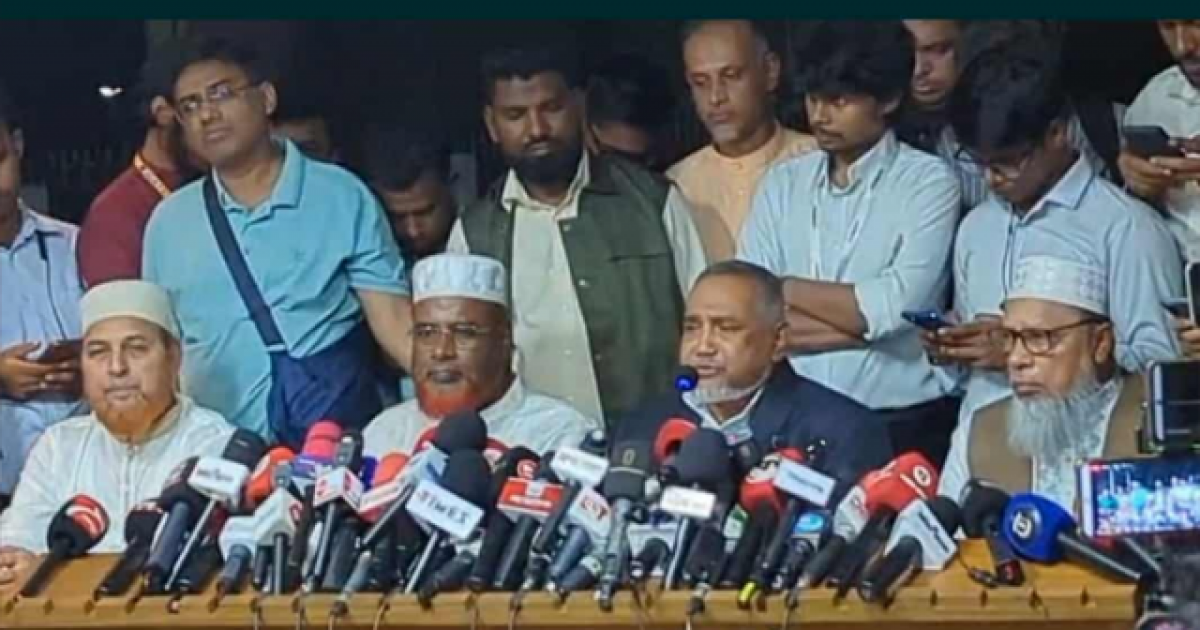Bangladesh’s Jamaat-e-Islami raised objections to several advisers to Chief Adviser Professor Muhammad Yunus during a meeting with him on Wednesday evening at the state guesthouse Jamuna.
The party, however, did not disclose the names of those advisers.
Following the meeting, Jamaat’s Nayeb-e-Ameer Dr Syed Abdullah Muhammad Taher told reporters, “We did not raise concerns about all advisers—only a few. We said some people around you (chief adviser) mislead you. We have confidence in you, but we believe some individuals close to you are working in favor of a particular party. You should remain cautious about them.”
A day earlier, the BNP had also raised similar concerns about several advisers during its meeting with the chief adviser, urging him to remove the “controversial” ones without mentioning names.
When asked whether Jamaat demanded the removal of any adviser, Taher said: “From the very beginning, we have been drawing attention to this matter. We have not demanded anyone’s removal yet. We are only raising awareness and allowing time for consideration. If nothing changes, we will decide our next steps accordingly.”
Taher clarified that the party did not demand the restoration of the caretaker government system, noting that a related case is still under hearing in the Supreme Court.
He added that Jamaat was awaiting the court’s verdict and expressed hope that the interim government would act in the spirit of a caretaker administration if the ruling does not contradict the court’s position.
When asked how the chief adviser responded to Jamaat’s concerns, Taher said: “The chief adviser told us he is seriously considering the matter and will take appropriate steps, In Sha Allah.”
He also said that the meeting also discussed the implementation process of the July Charter, the proposed referendum expected at the end of November, and the possible issuance of an extra-constitutional arrangement to facilitate the Charter’s execution.
Taher led a four-member delegation representing Jamaat-e-Islami at the meeting.
The chief adviser thanked Jamaat for signing the July Charter.
“We drew his attention to the importance of implementing the Charter,” Taher said.
Taher added, “He agreed with us that if it is not implemented, all the efforts will go in vain. He assured us that he would take the necessary initiatives.”
Jamaat urged the chief adviser to give the July Charter constitutional legitimacy through an executive order.
“This is not a constitutional provision; it is an extra-constitutional arrangement,” Taher explained, adding, “Any government facing a major political transition has the authority to issue such an order. The chief adviser agreed that it could be done through an executive order.”
Addressing differing opinions over issuing an ordinance, Taher said Jamaat did not support that option. “An ordinance is weak—it lacks the constitutional strength to ensure legitimacy. But an order is equivalent in power and authority to a constitutional amendment,” he argued.
“We have consulted our expert committee, which also held discussions with the Charter Commission’s expert committee. Both agreed that legitimacy must come through an executive order, followed by a referendum. We have made our stance clear, and we believe the chief adviser is convinced and will proceed in that direction.”



